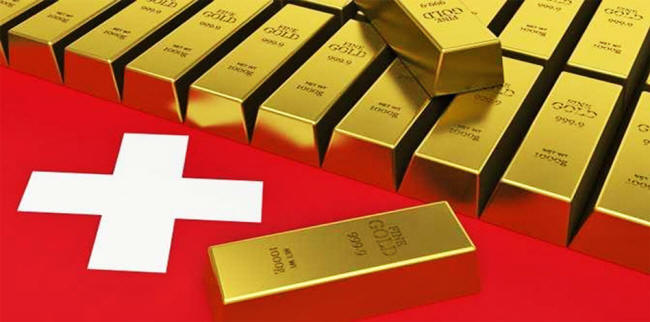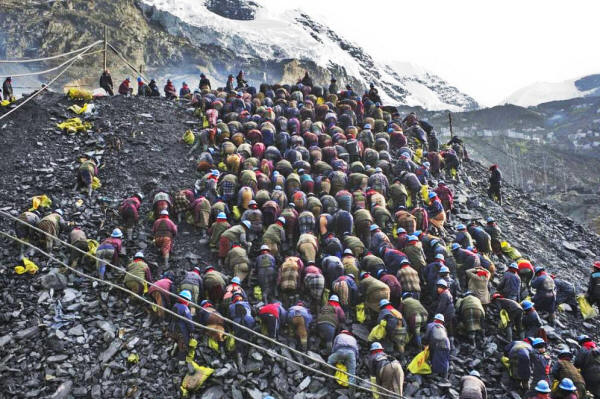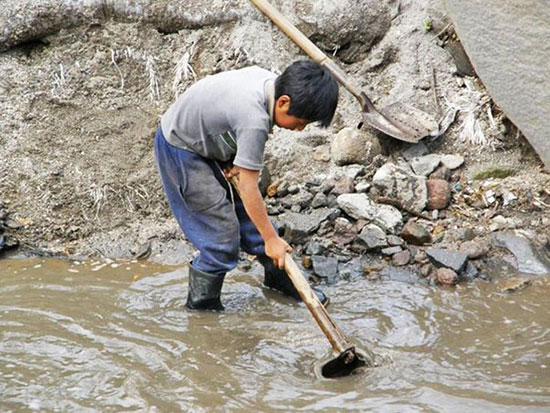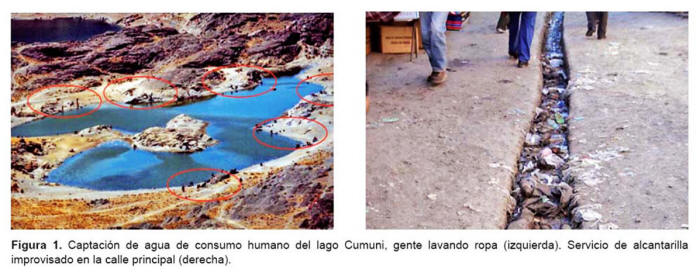|
La Rinconada, in the Peruvian Andes, the world's highest, chaotic, poisonous and illegal goldmines, some 210 km northeast of Puno, a 4-hour drive by car over partially paved, albeit potholed roads.
La Rinconada, near the just slightly more civilized mining town of Ananea (about 4,700 m above sea level), is also considered one of the most horrific places on earth:
La Rinconada looks and
smells like
a wide-open garbage dump, infested
by a slowly meandering yellowish-brownish mercury-contaminated brew
- tailings from illegal gold-mining - what used to be a pristine
mountain lake.
Average life expectancy
of a mine worker is 30-35 years, about half of Peruvian's average
life expectancy.
When the galleries collapse and a child - or several - dies, nobody cares. Many are not even identified. Most likely they are not missed. They are children of non-parents, like in non-humans, those that run this hellish mining industry, and those who send their children there to help them make a living.
No love, no ethics, no respect for nothing but the legendary gold nugget, for greed and necessity. No mercy.
That's La Rinconada...
Most are poor. Some are just greedy - the never-dying 'Gold Rausch' attracts them. The dream of getting rich in the goldmine makes them accept the most horrendous working and living conditions:
But the miners don't complain. Some bring their wives, few bring also their kids - it's their choice. Some stay 'temporarily' only, 6 months, 12 months, 2 years...
For some the dream of
hitting the riches never dies; they stay until they die. They know
they will be abused, enslaved. They know, they can take it or leave
it.
Sometimes day 30 brings nothing. Sometimes some rocks with traces of gold. All are hoping for a gold nugget. This type of mining wage is not unique to Peru.
Bolivia and other Andean countries that are open to the most environmentally and socially destructive industry - mining - apply similar systems.
The illusion to hit it BIG by finding the legendary 'gold rock' is a passion; it is obsessive.
And if and when a miner
does find a treasure to keep, he is vulnerable of being robbed, even
killed, body discarded - another miner gone missing. Or not. Just
disappeared. Maybe in a garbage dump. They are endless in Rinconada.
They reflect the character of Rinconada. Refuse, waste, stench and
death.
Miners come by their free will. They are not coerced. They enslave themselves, in the vane hope to get rich. Instead, they intoxicate themselves from mercury fumes, from a totally poisonous environment, daily exposure to heavy metals.
Their nervous system slowly but surely fails them:
For many, it's a dream
gone dead. That's what poverty does; it kills while dreaming of a
better world.
Nobody cares. It's
survival of the fittest - and often survival succumbs to hardship,
misery and yet hope for a better life.
They, huge world (in)famous
gold and precious metals corporations, are waiting 'downstream' to
buy the blood-ware, without identity, without origins. So that
nobody can trace them to the crime.
The mountains may get jealous, and who knows what jealousy is capable of doing.
Women have other chores:
La Rinconada - one of the most horrible places on earth. Hardly known to the rest of the world.
Most people in Lima, the capital of Peru, have no idea that Rinconada exists, and if they have heard the name, they associate it with a lush country club in the elite district of "La Molina" of Lima.
They don't know what it
also stands for... the "Devil's Paradise."
One of them is the Swiss registered Metalor, one of the world's largest gold foundries. Annually, about 3,000 to 3,500 tons of gold are mined across the globe. Switzerland refines about 70% to 80% of all the gold in the world.
An estimated 20% to 30%
of it is considered 'blood gold' - gold that stems from illicit
mining practices, child labor, environmental and social
destructions, land theft, corruption - like from Rinconada.
Switzerland does not impose a code of ethics on the corporations that enjoy the Swiss tax-haven. The Swiss Government pretends that these mining corporations have their own codes of conduct, and the Swiss authorities trust that they adhere to their own standards of ethics.
What an easy way out...!
That's the level of ethics one of the richest and reputedly most "noble" countries of the universe applies to keep her corporations happy.
Naturally, Switzerland is also the only OECD member that allows her parliamentarians to sit in as many corporate Boards of Directors as they wish.
Imagine! - a totally legalized conflict of interest. And nobody says 'beep'...
The Swiss populace just accepts this blunt aberration - most of them don't even know it exists.
They live comfortably and well, and don't care much about Human Rights abusing corporations, and less so that their Parliament is a humongous built-in corporate and banking lobby.
In this environment of
white-collar illicit behavior, corporations like Metalor and
Glencore flourish.
It is common practice
that Parliament, as well as the executive give their votum
before the public vote on a referendum, another unfair practice, as
it influences the voters' final decision.
Metalor is also investigated for participating in organized crime and money laundering from illicit gold deals (OjoPúblico, Peru, 14 March 2019):
Metalor is also being investigated for financing Minersur's purchasing and sales transactions of gold from illegal sources.
One of these illegal sources is La Rinconada. Other illegal sources stem from gold-digging in Peru's Madre de Dios Amazon Region, where thousands of hectares of rainforest are being raided and devastated by mafia-type organizations, similar to the ones in Rinconada.
Metalor denies the accusation, saying they only deal with reputable mining corporations.
The case is wide open and the stench of illegality that has been permeating Metalor for many years is as sickening as Rinconada itself.
The real industrial value of gold is only about 15% to 20% of its speculative market value...
But the gold fever is such that banks invented 'paper gold', meaning that Mr. and Mrs. Anybody can buy gold without ever seeing the gold bar.
The bank simply issues a certificate, an IOU for a certain amount of gold which, in theory, could be exchanged for the real thing at any time Madame Anybody would like to keep her gold bar in her personal household vault. Not so easy...
There is more than 100
times more paper gold floating around than real gold is available on
the market. If everybody would like to exchange their paper gold
into real gold, the banking system would collapse, or would just
simply fail to deliver.
By tradition Germany had about 1,200 tons of gold, worth about US$ 50 billion, deposited in the FED in New York.
In 2013, when the Germans awareness that their gold is being stored outside of German borders resulted in a public outcry, the Bundesbank wanted to withdraw and repatriate all of their foreign stored gold by 2020, but the FED said no, they could not deliver.
The gold was simply not available...
Was the FED using the
German gold and the gold of so many other countries deposited in the
FED's treasuries for speculation - rent seeking with somebody else's
assets?
Today, western moneys are fiat money, not even backed by gold, just hot air. But the Russian ruble and the Chinese yuan are backed by gold, as well as by their respective economies - who knows...
As a last-ditch effort to
save US-dollar and the western fiat money pyramid from collapsing,
the west may again revert to some kind of gold standard, a man-made
folly, when in fact, the only real value reflected in a county's
monetary system, is its economy.
And hundreds more of similarly devastating types mines around the world.
Perhaps when the value of
gold becomes what it ought to be, its industrial value and nothing
more and nothing less, humanity becomes richer by the values of
human decency and respect for each other...
|





